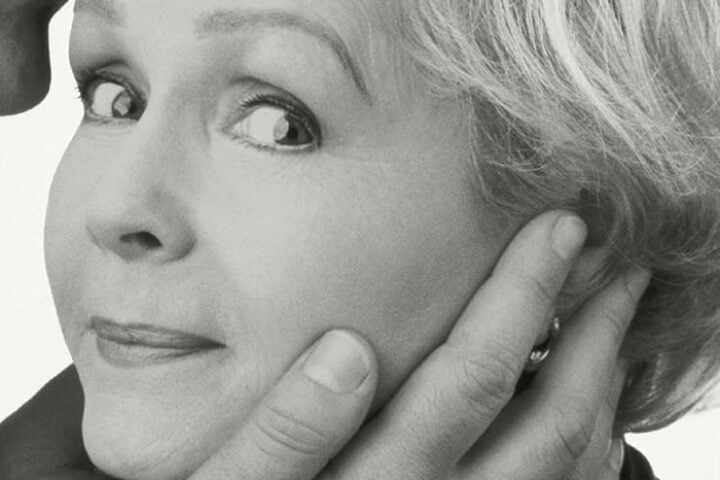In 1973, PBS aired a 12-episode documentary series called The American Family that followed a year in the life of the Loud family of Santa Barbara, California. At first blush the very image of postwar American prosperity and contentment, the Louds slowly unraveled over the course of the show, revealing fissures in the mother and father’s marriage and the tumult of teenage adolescence in a time of rapid social upheaval and growing pessimism.
Critics and academics continue to debate the extent to which the cameras’ presence throughout The American Family, which is widely referred to as the first example of an American reality TV show, merely captured the hidden side of an ostensibly happy family or engendered tension by virtue of the participants’ awareness of being filmed for public scrutiny. And it’s this angle that Albert Brooks explores in his feature-length directorial debut, Real Life, which begins as a silly spoof of An American Family’s conceit before slowly curdling into an acidic satire of American consumer values and the implications of turning ordinary people into mass-culture spectacles.
Brooks stars as documentary film producer Albert Brooks, who studies Arizonan veterinarian Warren Yeager (Charles Grodin) and his family, immediately complicating an already slippery separation of fact and fiction and calling our attention to the underlying vanity motivating Albert to make the documentary. As he notes in an early address to the camera, Albert cannot stop himself from imagining that his film will not only win an Oscar but possibly a Nobel Prize.
The majority of Real Life’s most accessible jokes come at the beginning as Albert immediately illustrates how much his project will undermine any possible claim to objectivity. We see him conducting tests to identify a suitably charismatic American family, putting adults and children through trials that look better suited to screening Apollo astronauts than documentary subjects, and the state-of-the-art cameras used to film the Yeagers are absurd contraptions that resemble diving suit helmets and could never possibly be ignored by either the family nor the people around them. Albert even goes so far as to remodel the Yeager home both for better ease of movement for the cameramen and to give more variety to what they can document.
No sooner does filming start than the Yeagers themselves dispense with whatever shred of fly-on-the-wall naturalism remained in Albert’s concept. At their first dinner on camera, Warren and his wife, Jeannette (Frances Lee McCain), get into a minor argument that Warren keeps interrupting to nervously tell the cameras that he and his wife typically don’t bicker, and his panic only deepens as his children (Lisa Urette and Robert Stirrat) talk back to their parents. Grodin, a master of cringe comedy and naturalistic improvisation, portrays Warren as a man perpetually casting one eye toward the nearest camera with nearly every sentence he utters, with each new thing he says largely being frantic PR spin for the previous one.
Perhaps the film’s most prescient scene involves the crew filming Warren performing surgery on a horse. Nerves wracked by the pressure of being recorded, Warren gets confused and orders a double dose of anesthetic that kills the animal. Agonized not only by his mistake but the awareness of what its broadcast would do for his career, Warren begs Albert to destroy the footage. But the documentarian softly assures him that everything will be fine and that his practice will not suffer. In Albert’s cajoling but firm refusal to sacrifice a good angle for the sake of a person’s actual livelihood is an eerie precursor to an era where reality TV producers are regularly called out for manipulating footage for the sake of heightening drama.
Albert cannot quite hide a sense of disgust at such ethical abasement, and if Real Life suffers in comparison to his subsequent films, it largely does so because the empathy he affords his characters is undermined by the offense he takes at the implications of reality TV. He pities the Yeagers more than he embodies their anxieties, while he depicts his documentarian as so morally destitute as to forestall humanity altogether. Nonetheless, Real Life epitomizes Brooks’s singular voice in the varied comedy landscape of the 1970s. If it seems a slightly lesser achievement than his subsequent features, that’s only because Brooks sharpened his considerable gifts even further over the next two decades of his career.
Image/Sound
Sourced from a 4K restoration approved by Albert Brooks, this UHD transfer offers an incredibly film-like presentation. Naturally lit exteriors have a bright, slightly washed-out quality that’s inherent to the original image, while the neutral tones and soft interior lighting that define the interiors of the Yeager home show a crisp level of detail and natural gradations of color. The lossless mono is clear and ably balances the dialogue and background effects of street noise and the soft shuffle of the cameramen darting around the Yeagers.
Extras
The Criterion Collection’s disc is relatively light on extras. In separate interviews, Brooks and actor Frances Lee McCain share their memories of the film’s making, with Brooks also offering insights into his career leading up to it. The disc also comes with Brooks’s high-concept theatrical trailer for Real Life, an amusing short redolent of his experimental films for Saturday Night Live that includes no footage from the film itself and adopts a hazy faux-3D filter for comic effect. A booklet essay by critic A.S. Hamrah contextualizes Brooks’s satire as a reaction not only to the earliest form of reality TV but the wave of direct cinema documentary film popularized by the likes of Jean Rouch and D.A. Pennebaker.
Overall
Albert Brooks’s acidic feature debut receives an excellent 4K edition from Criterion.
Since 2001, we've brought you uncompromising, candid takes on the world of film, music, television, video games, theater, and more. Independently owned and operated publications like Slant have been hit hard in recent years, but we’re committed to keeping our content free and accessible—meaning no paywalls or fees.
If you like what we do, please consider subscribing to our Patreon or making a donation.




